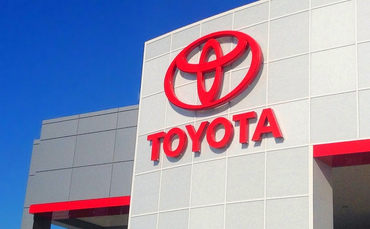Stock Spotlight: Toyota EV pivot may not be enough to catch Tesla

As one of the world's largest automakers, Toyota claims around 51% of the market share in Japan and 15% in the US.
The company has traditionally focused on petrol-fuelled vehicle production, but when lead operating officer Koji Sato took over as CEO from his long-term mentor, Akio Toyoda, he brought in sweeping changes to help focus the business on EV and battery manufacturing.
Stock Spotlight: General Motors struggles to shift gears as strike concludes[1]
Carl Vine, co-head of Asia Pacific equity team at M&G Investments, said not everyone had realised the significance of the grandson of the company's founder and former Lexus CEO taking over for the firm's ethos.
"We believe this is an important cultural shift," he said. "Toyota is becoming more open than ever; determined to do what is necessary to succeed as a global leader in the mobility industry in the decades ahead."
The new head set targets to sell 3.5 million electric vehicles in 2030, of which 1.7 million are set to be next generation EVs from the new BEV Factory organisation, which will start arriving in 2026.
As part of its commitment, the company made a further $8bn investment in a North Carolina battery plant last month, the largest such investment by a foreign carmaker since the US passed the Inflation Reduction Act in 2022.
Stock Spotlight: American Express charges ahead despite economic uncertainties[2]
David Whiston, a strategist for Morningstar Research Services, said that putting more plants outside of Japan would also help Toyota mitigate some of the currency risk of the currently weak yen.
In the latest financial summary covering three months to September, the company cut its EV forecast sales by 39% to just 123,000 units, although this would still be significantly more than the 38,000 it sold during the 2022-2023 fiscal year.
Toyota also cut its sales forecast of hydrogen fuel-cell EVs from 8,000 units, down to 5,000 units, a niche of the auto space, which Karen See, manager of the Baillie Gifford Japanese Income Growth, said had been a focus for the firm before its recent electrification pivot.
Despite Toyota being one of the major companies in the Japanese equity market, See explained that her fund did not hold the stock as they were not optimistic that its push into EVs would be enough to catch up with Tesla.
"When we look at what the Japanese carmakers have in terms of in terms of technology relative to some of the other global makers, we are not convinced that they are actually that competitive at the moment," she said.
"I know Toyota has come out and talked a lot about making huge amount of investment in this space, but the question for us is, can it catch up in terms of the technology. We are just not convinced, particularly with the kind of prices that a lot of these car makers are treated at that moment...that they are winning the race when it comes to technology."
Stock Spotlight: Deliveroo offers buyback plan as ESG concerns linger[3]
Whiston was more confident on Toyota's ability to challenge Elon Musk's EV company, arguing that although the carmaker is currently trailing Tesla and General Motors in EVs, "it is capable of catching up".
The company faces a major battle in the auto space, he added, which is already "suffering from global overcapacity that creates pricing pressure and makes it difficult to earn high economic profits for all participants".
The strategist said Toyota's competitors were "the strongest and most numerous they have been in decades and the firm is catching up on battery electric vehicles since it did not originally move as aggressively on BEVs as its competitors".
References
- ^ Stock Spotlight: General Motors struggles to shift gears as strike concludes (www.investmentweek.co.uk)
- ^ Stock Spotlight: American Express charges ahead despite economic uncertainties (www.investmentweek.co.uk)
- ^ Stock Spotlight: Deliveroo offers buyback plan as ESG concerns linger (www.investmentweek.co.uk)